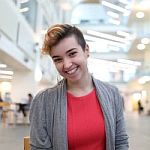GAM 2019 Blog
by Anna Voelker
- Published: Tuesday, April 16 2019 03:14
A blind student once asked me how dark matter got its name. I told her that its matter, or stuff, that we don’t yet understand and cannot see, and when astronomers can’t see something they like to call it “dark.” As she chuckled I realized that this explanation must sound pretty silly to a student who does not see at all. “They should let me do the naming,” she said with a smile. “We’d have a lot of things named dark.” The funny thing about our Universe is that the inconceivably vast majority of it cannot be seen by humans, blind and sighted alike. Yet somewhere along the way the study of space became thought of as a visual science. Blind learners are not the only ones facing societal fabricated barriers to astronomy. From an under-representation of scientists and engineers with disabilities to a deficit of educational materials available for students with specialized needs, there is a plethora of accessibility issues in the world of astronomy and STEM. I am passionate about sharing the fact that there is more than one way to study the stars; there is more than one way to do science. It is the responsibility of educators, scientists, and mentors to let students with disabilities and other marginalized identities know that not only is there room for them in science—there is a need for them
So what can you do this GAM to encourage accessibility in your community? This year AWB is implementing a new program called OpenSpace, which is part of the 2019 Apollo 100 Program. OpenSpace is dedicated to fostering inclusion and accessibility in astronomy outreach events and programs around the word. You can join the OpenSpace movement by reviewing these accessibility guidelines and resources to ensure that your GAM event is engaging for all. When you register your GAM event with AWB, you will be given the option to check whether or not this is an accessible “OpenSpace Event.” From 3D prints to the sounds of space, we encourage you to check out the multi-sensory resources available regardless of whether or not you are planning an event this GAM!
OpenSpace will culminate in SciAccess: The Science Accessibility. SciAccess is an international conference being hosted at The Ohio State University on June 28 and 29, 2019. This is an interdisciplinary event dedicated to promoting disability inclusion and diversity in science, technology, engineering, art, and mathematics (STEAM). SciAccess will connect a global network of people who are passionate about STEAM access and education. The conference will feature keynote speakers Dr. Temple Grandin, renowned autism advocate, and Anousheh Ansari, the first female private space explorer. Have an idea or experience that you wish to share? Then apply to be a SciAccess speaker by April 18, 2019! Registrations are due April 25. Please visit SciAccess.org for more details. For conference updates, join the SciAccess Facebook Event.
| Anna Voelker is the Astronomy Accessibility Program Coordinator at The Ohio State University and the Chair of the Astronomers Without Borders Accessibility and Inclusion Working Group. She is organizing SciAccess, a conference dedicated to disability inclusion in science, thanks to the support of The Ohio State University President’s Prize, an award that she received in 2018. Anna is passionate about accessibility and educational equity. She is thrilled to use SciAccess as an opportunity to promote disability inclusion and diversity in the STEAM fields. Previously, Anna was a visiting fellow at the International Astronomical Union's Office of Astronomy for Development, headquartered at the South African Astronomical Observatory. She is also a Brooke Owens Fellow and has worked at a variety of space science institutions, including NASA Goddard Space Flight Center, NASA Kennedy Space Center, the Space Telescope Science Institute, and the Aerospace Corporation. |  |






